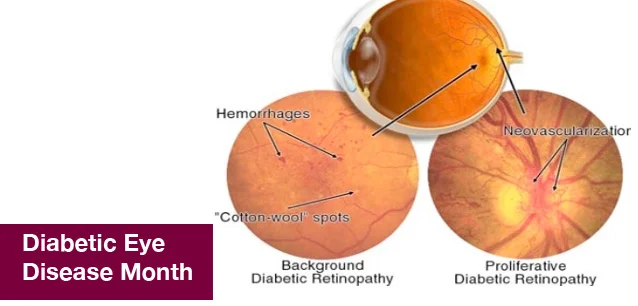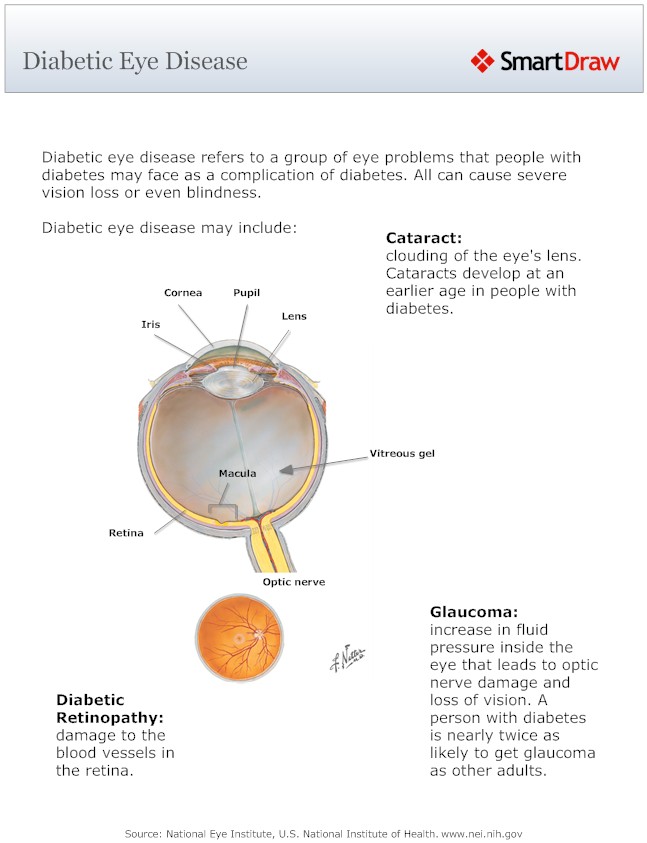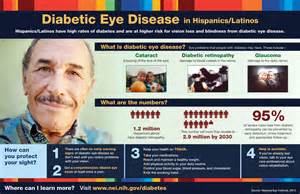 AD
AD
Today is: November 24
Scroll to explore events active on this date.
LEEP INK FEATURES

Nuanced November 2024
November is the start of the holiday season in many parts of the world. It is a time for family, football, food, shopping and decorating, particularly in the Christian and Jewish world, leading to Christmas and...

December's Gift
Events in December 2024. Well, we made it to December. December is the holiday season, particularly in Western nations, where Christianity and Judaism are the faiths most common in the nation's past. ...

August is Appropos
A toddler playing in the fountain at a park in Santa Fe, New Mexico—Photo LD Lewis. In August, we live through the Dog Days of Summer. It's hot and often humid, and those ...
About National Diabetic Eye Disease Month
Seniors , United States
Ends: Nov 30, 2025
DESCRIPTION:
Diabetic Eye Disease Month raises awareness about diabetes, diabetic eye disease, the importance of early disease detection, and related preventive health services covered by Medicare.
Diabetes can lead to severe complications such as heart disease, stroke, vision loss, kidney disease, nerve damage, and amputation, among others, and it's a significant risk factor for developing glaucoma. People with diabetes are more susceptible to many other illnesses, such as pneumonia and influenza, and are more likely to die from these than people who do not have diabetes.
Diabetes is a chronic health condition affecting millions globally and has increased in prevalence over the past few decades. Marked by elevated blood sugar levels, diabetes typically falls into two classifications, either Type 1 or Type 2.
Type 1 diabetes, often diagnosed in children and young adults, occurs when the body cannot produce insulin, a hormone crucial for regulating blood sugar.
Type 2 diabetes, the more common form, arises when the body cannot effectively use the insulin it produces or can't make enough, typically diagnosed in adults.
The origins of diabetes can be traced back to ancient times, with mentions in Egyptian manuscripts dating back to 1552 BC. However, the term "diabetes," derived from the Greek word "to siphon," was coined in the by Aretaeus of Cappadocia (129-199 AD). Over time, medical understanding of the condition has evolved significantly. Still, it was in the 1921 discovery of insulin, through the work of Frederick Banting, Charles Best, James Collip, and John Macleod, that treatment became available. Their work began in November 1920, thus the reason for November being a focus for diabetes.
Various factors contribute to the onset of diabetes, ranging from genetics to lifestyle choices. Type 1, generally considered an autoimmune disease, currently has no definitive preventive measures. For Type 2, however, a diet high in sugar and fats, lack of physical activity, and obesity are major risk factors. Diabetes affects all genders, ages, and ethnicities.
According to the World Health Organization, by 2020, approximately 422 million people worldwide have diabetes, a fourfold increase from the estimates in 1980. One hundred thirty million adults are living with diabetes or prediabetes in the United States, per the Centers for Disease Control and Prevention's latest 2022 figures. The International Diabetes Federation projects that approximately 783 million globally will be living with diabetes by 2045.
While diabetes affects people of all backgrounds, it disproportionately impacts minority communities and those with lower socioeconomic status, exacerbating health inequalities.
Diabetes is often dubbed a "silent killer" due to its long-term complications if not managed effectively. It can lead to serious conditions like heart disease, stroke, kidney failure, blindness, and lower limb amputation. However, through regular monitoring, medication, and lifestyle changes, it can be managed effectively, allowing patients to lead fulfilling lives.
VIDEOS
ADDITIONAL IMAGES
Where would you like to go now?
 AD
AD






/footer-logo.svg)
